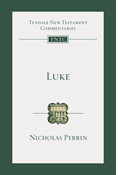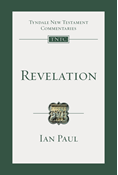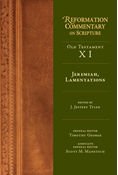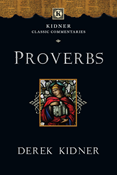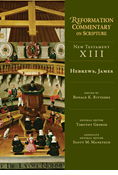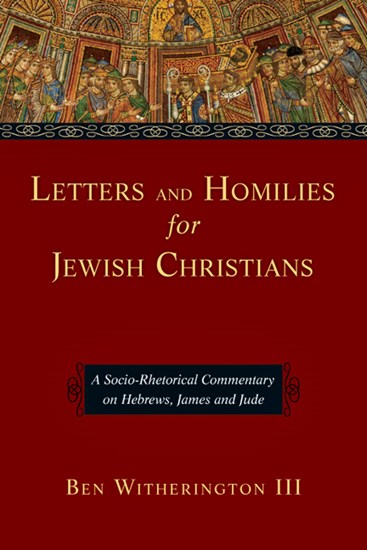
|
Letters and Homilies for Jewish Christians
ebook
|
- Length: 656 pages
- Published: April 09, 2010
- Imprint: IVP Academic
- Item Code: 6723
- ISBN: 9780830867233
-
Other Retailers:
Amazon*
*affiliate partner
In this commentary on Hebrews, James and Jude, Ben Witherington III applies his socio-rhetorical method to elucidate these letters within their primarily Jewish context, probing the social setting of the readers and the rhetorical strategies of the authors of the letters.
"A rich commentary."
"Very useful for preachers, teachers, and interested church members who may want to know more about the contribution of the socio-rhetorical approach to the study of the Bible and its social background. In that respect, this volume is very rich."
"The value of this book is that Witherington offers a helpful exegesis of the text and wrestles with the issues that each book raises resulting in a commendable resource for students and pastors."
"A perfect volume for those who might want to teach or preach from—but not necessarily specialize in—one of these letters, this commentary serves as an excellent basic reference for these often less familiar and under appreciated New Testament sermons."
CONTENTS
Preface
Abbreviations
Part 1: The Sermon to the Hebrews
Introduction to Hebrews
Authorship, Provenance and Date of Hebrews
Intertextuality, Greek Style, Rhetoric and Literary Structure of Hebrews
The Heavenly High Priest: Christology in Hebrews
Recognition and Canonization of Hebrews
Bibliography on Hebrews
Hebrews
Exordium: The Radiance of the Son (Heb 1:1-4)
A Closer Look: God and the Son: The Question of Divine Identity
A Closer Look: The Psalms in Hebrews and Elsewhere in the New Testament and Their Christological Use
Exposition and Exhortation, Round One: The Sevenfold Witness and the
Greater Salvation (Heb 1:5-2:4)
Exposition and Exhortation, Round Two: Lower Than the Angels,
Greater Than Moses, Gone Through the Heavens, Entering His Rest
(Heb 2:5-3:19)
A Closer Look: The Rhetoric of Encomium: Heroic Trailblazer, Liberator and High Priest
A Closer Look: The Completion/Perfection of Jesus and His Brothers and Sisters
The One Greater Than Moses Requires a Better Response and Provides a Better Result (Heb 3:1-19)
The "Rest" of the Story (Heb 4:1-13)
A Closer Look: Sabbath Rest for Jewish Christians?
A Closer Look: The End and Aims of Eschatology in Hebrews
Exposition and Exhortation, Round Three: The Well-Tested High Priest (Heb 4:14-5:10)
Exhortation: Avoid Apostasy, Imitate Those Persevering (Heb 5:11-6:12)
A Closer Look: The Exegetical Arm-Wrestling of Protestants over
Hebrews 6:1-6: A "Taste" of the Debate
Transitus: The Forefather and the Foreshadowed Priest (Heb 6:13-20)
A Closer Look: Let Us Praise Our High Priest
Central Exposition, Part One: Abraham, Melchizedek and Jesus (Heb 7:1-8:6)
A Closer Look: Covenant or Testament?
Central Exposition, Part Two: Christ, the Sacrifice of the New Covenant (Heb 8:7-10:18)
Exhortation: Holding on Unswervingly as the Day Approaches (Heb 10:19-39)
The Rough Ride to the Kingdom (Heb 11:1-12:17)
A Closer Look: The Use of Examples in Epideictic Rhetoric
A Closer Look: Resident Aliens in Their Own City
A Closer Look: A Guide for Those Perplexed by Hebrews 11:32-38
Peroration: Theophanies Behind and Before Them (Heb 12:18-29)
A Closer Look: Realized Eschatology in Hebrews?
Final Exhortations and Epistolary Closing (Heb 13:1-25)
Bridging the Horizons
The Conquest of Faith and the Climax of History (Heb 12:1-4, 18-29)
Part 2: James the Homily
Introduction to James
Text History and Interpretation of James
Language of James
Voice and Rhetorical Character of James
Jesus? Sayings in James
Authorship of James
Social Ethos of James?s Audience and Home Congregation
Structure of James
Bibliography on James
James
Epistolary Prescript (Jas 1:1)
Exordium: Of Trials and Temptations and Standing the Test (Jas 1:2-18)
A Closer Look: Being Frank with Francis
Propositio: Quick Listening, Slowing Speaking, Insistent Doing of the Word (Jas 1:19-27)
A Closer Look: The Word or the Law? James?s View
Elaboration of Themes, Part One: Rich and Poor, Word and Deed (Jas 2:1-26)
A Closer Look: The Voice of Jesus in the Rhetoric of James
A Closer Look: Dueling Apostles? The Discussion Ancient and Modern
Elaboration of Themes, Part Two: Teachers Taming the Tongue (Jas 3:1-18)
A Closer Look: James: Sapiential Scribe or Creative Sage?
Elaboration of Themes, Part Three: Combating the Desires and Antiwisdom of the Mercenary and Military Mentality (Jas 4:1-5:6)
A Closer Look: The Social Setting of James Once More
A Closer Look: The Use of the Terms "Lord" and "Righteous One" in James 5
Peroration: Wait, Pray, Rescue the Wandering for the Lord Is Coming (Jas 5:7-20)
James and the Author of Hebrews?Twin Sons of Different Mothers?
Bridging the Horizons
Part 3: Jude--Another Brother's Sermon
Introduction to Jude
Jude--the Man
Galilee and the Hellenizing of the Holy Land
Jude--the Discourse: Its Rhetoric and Relationships
Jude?s Audience
Greek Text of Jude
Bibliography on Jude
Jude
Epistolary Prescript and Opening Discourse Elements: "Necessity Arose" (Jude 1-4)
A Closer Look: Jude?s Use of Sacred Texts and Traditions
Probatio: Proofs of the Character and Fate of the Intruders (Jude 5-16)
A Closer Look: Inspiration and Authority and the Citing of Noncanonical Texts
Peroration: "Tearing Down and Building Up" (Jude 17-23)
Closing Doxology: The Divine Guardian (Jude 24-25)
Conclusion
Index of Names
Index of Ancient Sources



